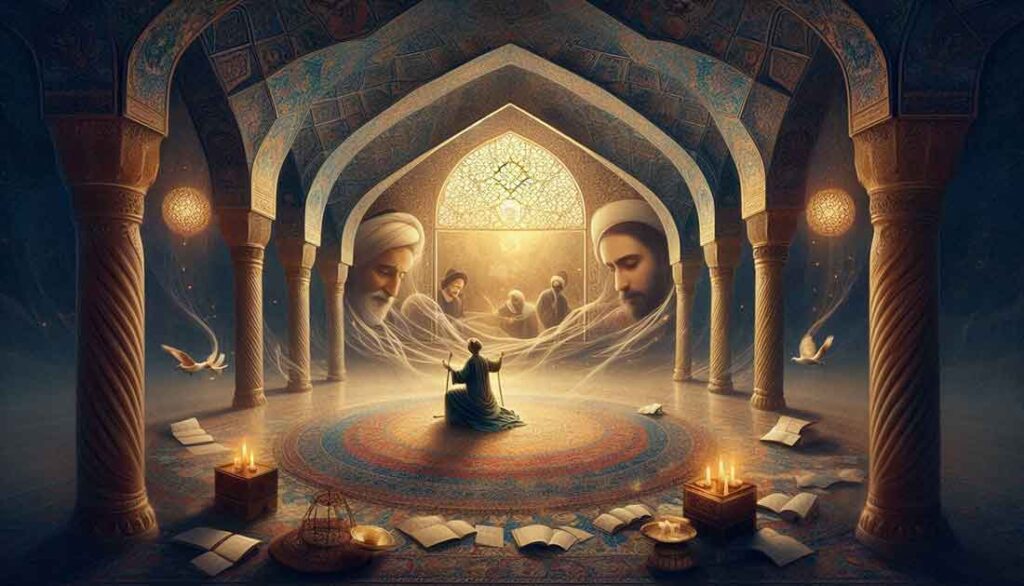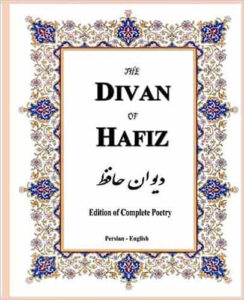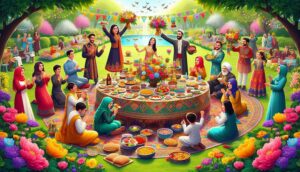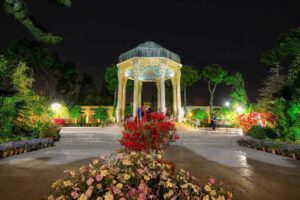In a world increasingly dominated by fleeting trends and ephemeral distractions, the profound insights of Hafez, Iran’s greatest poet, resonate with an enduring wisdom that transcends time and space. Born in the 14th century in the vibrant city of Shiraz, Hafez’s lyrical verses capture the essence of love, spirituality, and the human experience, weaving together a tapestry of emotion that continues to inspire readers across generations and cultures. His poetry, rich with metaphor and sensual imagery, reflects a deep understanding of life’s complexities, inviting us to explore the intricate dance between joy and sorrow, beauty and despair. In this blog post, we will delve into the life and legacy of Hafez, uncovering the timeless themes that echo through his work and examining how his words still guide us in our quest for meaning and connection in today’s fast-paced world. Join us on a journey through the enchanting verses of Hafez as we celebrate the enduring power of poetry to illuminate our lives.

Table of Contents
Toggle1. The Life of Hafez: A Glimpse into the Poet’s World
Hafez, often hailed as Iran’s greatest poet, lived during the 14th century in Shiraz, a city steeped in culture and history. Born around 1315, his life coincided with political turmoil and social change. Yet, within this chaos, he found inspiration, crafting verses that resonated with universal themes of love, spirituality, and the human condition. While much of his life remains shrouded in mystery, it is believed that Hafez was born to a modest family and received a traditional education, immersing himself in the rich tapestry of Persian literature, philosophy, and mysticism.
Shiraz, a vibrant center of arts and learning, served as Hafez’s muse, shaping his poetic voice. The city’s gardens, bustling bazaars, and lyrical atmosphere infused his work with a deep appreciation for beauty and the fleeting nature of existence. Hafez’s poetry often reflects his passion for life, celebrating love as a romantic pursuit and a divine longing—a connection to something greater than oneself.
Throughout his life, Hafez engaged with the Sufi tradition, blending mystical elements into his poetry that often challenged societal norms and highlighted the importance of personal experience over rigid orthodoxy. His verses, rich with metaphors and layered meanings, invite readers to ponder the complexities of love, faith, and the quest for truth. Despite the constraints of his time, Hafez’s voice remained unyielding, advocating for an authentic existence and encouraging individuals to embrace the joys and sorrows of life.
Today, Hafez’s legacy thrives, and his ghazals continue to be celebrated in Iran and worldwide. His influence can be seen in the works of countless poets, writers, and artists who draw inspiration from his profound insights and lyrical beauty. To delve into the life of Hafez is to embark on a journey through the heart of Persian culture, where the boundaries between the earthly and the divine blur, inviting us all to explore the timeless wisdom within his verses.
2. Key Themes in Hafez’s Poetry: Love, Spirituality, and Humanity
Hafez’s poetry is a rich tapestry woven from the threads of love, spirituality, and humanity, reflecting the multifaceted nature of human experience. At the heart of his work lies an exploration of earthly and divine love. Hafez often depicts love as a mystical force that transcends the physical realm, capturing the beauty of human relationships and serving as a metaphor for the soul’s longing for union with the divine. His verses are infused with a sense of yearning, portraying love as an emotion and a transformative journey that leads to more profound self-discovery and enlightenment.
Spirituality is another cornerstone of Hafez’s poetry. His writings invite readers to contemplate the nature of existence and the pursuit of truth. He masterfully blends Sufi mysticism with everyday experiences, encouraging introspection and a connection to the divine. Hafez urges us to seek the sacred in the mundane through his eloquent verses, illuminating the path toward inner peace and spiritual awakening. This duality of love and spirituality is a recurring theme, often depicted through metaphors of wine and the beloved, symbolizing earthly pleasures and spiritual ecstasy.
Moreover, Hafez’s poetry resonates with a profound sense of humanity. He addresses the universal struggles and joys of life, emphasizing compassion, empathy, and the shared experiences of all people. His keen observations on human nature and society make his work timeless, as they transcend cultural boundaries and speak to the core of what it means to be human. Hafez’s verses celebrate our connections to one another and remind us of the importance of kindness and understanding in an often chaotic world.
The key themes of love, spirituality, and humanity in Hafez’s poetry create a compelling dialogue that continues to captivate readers across generations. His wisdom invites us to reflect on our lives, encouraging us to embrace love in all its forms, seek a deeper understanding of ourselves and the universe, and celebrate our shared humanity. Through Hafez’s timeless verses, the poet’s legacy lives on, offering guidance and inspiration to all who venture into the realms of his enchanting words.
3. The Use of Metaphor and Imagery in Hafez’s Work
The poetry of Hafez is renowned for its exquisite use of metaphor and imagery, which intertwine to create layers of meaning that resonate with readers across generations. His verses are not merely lyrical expressions but a rich tapestry of symbols inviting deep reflection and emotional engagement. Hafez frequently employs metaphors drawn from nature, love, and mysticism, transforming everyday experiences into profound insights.
For instance, the image of the wine cup in his poetry transcends its literal meaning, serving as a metaphor for divine love and the intoxication of spiritual enlightenment. When describing a beloved’s beauty, he often uses lush imagery that evokes the vibrancy of roses, nightingales, and the intoxicating scent of blooming gardens, creating a sensuous landscape that immerses the reader in the moment.
Furthermore, Hafez’s use of duality—juxtaposing the earthly and the divine—allows him to explore complex themes such as the fleeting nature of life and the quest for eternal truth. His imagery often reflects a tension between the material and the spiritual, encouraging readers to contemplate their desires and deeper meanings.
Hafez paints an enchanting picture of his world through these masterful metaphors and vivid imagery and invites us to embark on self-discovery and introspection. His work resonates because it speaks to universal human experiences, transcending time and culture and reminding us of the beauty in our joys and sorrows. The layers of metaphor in Hafez’s poetry beckons readers to peel back the surface and uncover the timeless wisdom within, making his legacy a treasure trove for anyone seeking to explore the depths of human emotion and existence.
4. Hafez’s Influence on Persian Literature and Culture
Hafez, often hailed as Iran’s greatest poet, has left an indelible mark on Persian literature and culture that continues to resonate through centuries. His unique ability to weave intricate themes of love, spirituality, and the human experience into lyrical verses has captivated readers and influenced countless poets and writers across generations. Hafez’s ghazals, characterized by their rich imagery and profound emotional depth, explore the nuances of love—divine and earthly—while simultaneously challenging his time’s rigid social and religious norms.
His influence extends beyond literary circles; it permeates various aspects of Iranian culture, from music to art. Many contemporary Iranian musicians draw inspiration from his verses, setting them to melodies that evoke nostalgia and longing. Visual artists often depict Hafez in their works, celebrating his legacy by capturing the essence of his poetry through rich colors and intricate designs. Moreover, his poetry is a staple in Persian homes, often recited at gatherings and special occasions, reflecting the poet’s enduring presence in everyday life.
Hafez has also become a symbol of resistance and resilience for many Iranians, embodying the spirit of intellectual freedom and the quest for truth. His verses are frequently quoted in political discourse, reminding him of the importance of love, beauty, and authenticity in adversity. The annual tradition of “Shab-e Hafez,” where people gather to read his poetry and seek guidance from his words, further illustrates his profound impact on Iranian culture. Hafez’s timeless wisdom continues to inspire and unite people, making him a poetic icon and a cultural beacon transcending time and place. Through the lens of Hafez, we experience a poetic heritage that speaks to the heart and soul of humanity, reminding us that love and beauty are eternal pursuits.







